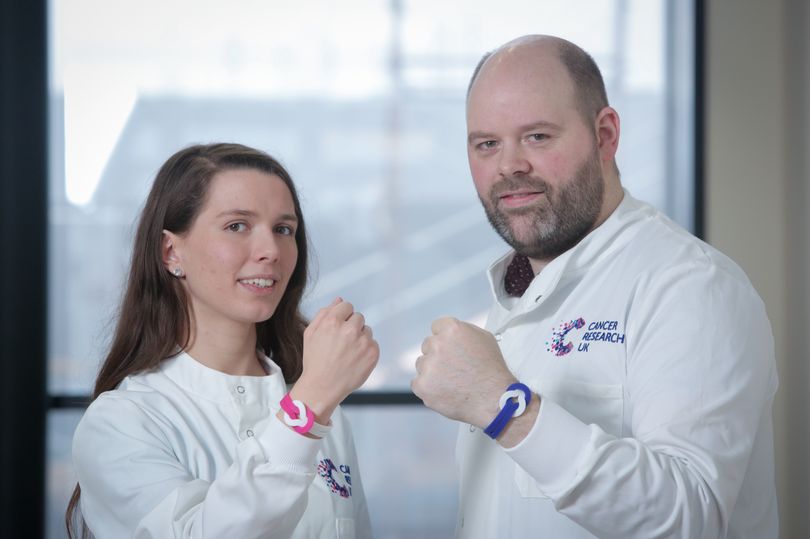QUEEN'S UNIVERSITY SCIENTISTS INVITE CITY TO UNITE FOR WORLD CANCER DAY
QUEEN'S UNIVERSITY SCIENTISTS INVITE CITY TO UNITE FOR WORLD CANCER DAY

Marked on February 4, World Cancer Day is designed to raise awareness of cancer and to promote its prevention, detection and treatment.
Dr Matt Humphries said, “Every hour someone in Northern Ireland is diagnosed with cancer so by wearing a Cancer Research UK Unity Band, people can show solidarity to those affected by the disease”.
“As a cancer scientist, I know first-hand the impact the disease has on individuals and families. That’s why I’m inviting everyone to be part of a movement that can help make a real difference to so many people’s lives.”
Together they are working on a ground breaking project to develop new ways of analysing tumours that could help doctors identify the best treatments for patients.
Dr Humphries continues, “Our area of research is known as digital molecular pathology. Queen’s University have developed a computer program* which allows us to examine tissue from tumours very quickly and at a very high level of detail”.
“Using this programme we can gather huge amounts of data about lots of different cancer types. Our hope is that we can identify patterns in this data that could help identify groups of patients who might benefit from new treatment strategies.”
Doctors Humphries and Craig are working on research funded by Cancer Research UK Centres Network Accelerator Award, led by Professor Manuel Salto-Tellez and Dr Jacqueline James at the Northern Ireland Molecular Pathology Lab at Queen’s University. The charity awarded £3.9 million to the university in 2015, to develop new pathology and image analysis techniques for solid tumours.
Dr Humphries explained, “This task would be impractical for a single pathologist, if not impossible, as manually reviewing slides of tumour samples is a very slow process.
“For example, before the introduction of this programme, I was able to thoroughly analyse around 500 to 1,000 samples over a 12 month period.
“Since coming to Northern Ireland six months ago to work on this project, I have been able to review thousands of samples using this new computer software.
One avenue of research the scientists are currently exploring is to study how the immune system interacts with bowel cancer. They are using one of the largest collections of patient samples assembled, which will include samples from patients across the UK.
“We are looking at the response of the patients’ immune cells to treatment and cancer. Our ultimate goal will be to accurately categorise patients into appropriate treatment groups, according to the nature of their tumour. We hope that this could lead to better treatment strategies, tailored to patients, that could ultimately improve survival,” adds Dr Craig.
This programme of research will be carried out in collaboration with the Northern Ireland Biobank, a joint project between Queen’s University Belfast and the Belfast Health and Social Care Trust.
One in two people born after 1960 in the UK will be diagnosed with cancer at some point in their lifetime and although survival has doubled since the early 1970s, Cancer Research UK needs everyone to act right now to help this progress continue.
Jean Walsh, Cancer Research UK spokesperson for Northern Ireland said: "Belfast is recognised worldwide for ground-breaking cancer research and last year around £3 million on our life-saving work in Belfast.
“Banding together on World Cancer Day is a unique way for people in Northern Ireland to unite with the rest of the UK, and the world. It’s a chance to show that, together, we are a powerful force against cancer.”
Media
Media Enquiries to Sian Devlin, s.devlin@qub.ac.uk or (+44) 28 9097 5292.
